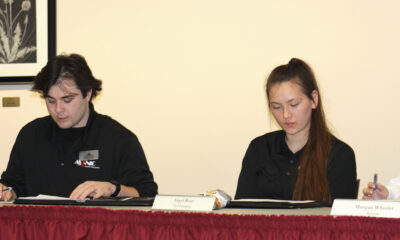Uncategorized
Students, faculty remain divided over philosophy curriculum
Philosophy Club hosted a Curriculum Council Summit on February 19, where impassioned students met with faculty to discuss the possibility of adding three classes into the curriculum: environmental ethics, history of modern philosophy and history of ancient philosophy.
While little opposition is being given to environmental ethics, the classes the philosophy students stressed the most—both the history classes—are the ones faculty aren’t quite agreeing on. While arguments were given from both sides on this summit, the meeting didn’t quite meet a point of closure, and seemingly created more questions than answers.
The students set up this meeting to hear the voices of the philosophy department, whom they felt had not made clear the reasoning behind their opposition. “The point was to get the discussion going, have [the faculty] show up, and give their point of view,” said social and behavioral sciences instructor Ed Kaitz. “And I think the students deserve to hear from them.”
Within the department, there are three instructors who do not want to see the classes passed. “The interesting thing to me was the three other instructors who do have a vote—they didn’t say anything,” said Kaitz. These three instructors were Laura Templeman, Pat Lippert and Michelle Lippert. Opposition from those whose votes didn’t count within the department, though, brought up arguments.
One of the major reasons was the core curriculum—which has recently gone into a moratorium to be reassessed by the State of Idaho. No classes are being accepted into the core curriculum, so the students are requesting the classes serve as electives. According to philosophy instructor Pat Lippert, this doesn’t necessarily resolve the issue.
“We’ve gotten to a situation where we’ve just paused with regards to courses and everything because the largest impetus is from the State of Idaho,” Lippert said. “It’s redoing its general ed. and it’s going to take a while, and then when we come back out of that we’re going to have to consider new classes as how they fit into the new courses of general ed. and they’re starting with the courses that we already have.”
Kaitz has spoken to the division chairs of seven different universities and verified with all of them that given the syllabi he has created for the classes, they would be willing to accept them.
This leads to another, more contentious question: if a four-year university accepts something taught at our two-year college, what will happen with the discrepancy between the class levels (1-200 level classes vs. 3-400)?
The school that is accepting the class determines how many credits it’ll be accepted as—but there’s some question as to the legality of it.
During the Philosophy Summit meeting, adjunct philosophy instructor Tom Flynt brought up Idaho statute 33-2102 of “Courses of Study” which says: “A community college established pursuant to the provisions of this chapter shall give instruction in academic subjects, and in such nonacademic subjects as shall be authorized by its board of trustees.
The academic courses given and the instruction therein shall be of the same standard as the same are given and taught in the first two (2) years of any other state institution of higher education, and credits therefor shall be accepted by other state institutions for credit toward a baccalaureate degree.”
However, nobody else is really worried about it, as technically multiple classes would be breaking that law currently, and some instructors are certain it’s wrong. “I just don’t know how to address someone who says they are illegal, especially if we know, number one: it’s false,” Kaitz said. “And number two, that that same argument has been being made for almost four years. So I’m not really sure why it keeps coming up.”
Regardless, if classes are accepted at higher-level universities, they’ll only be satisfying the course load of so-many points (100-200), instead of the higher-level requirements transfer students need in order to graduate from four-year universities.
This doesn’t necessarily stand as something that might deter students. They’d be learning higher-learning concepts Without spending the higher university cost—which would increase their education early on and allow them to tackle more challenging classes in the future. Pat Lippert said he disagrees with this.
“The amount of money you’re going to save in relation to the amount of money you’re going to spend is not that big,” said Lippert. “It’s not that huge.”
Lippert said he also disagrees with it on a moral level.
“It’s just a difference of mission, and how we understand the mission of what we do. And I understand my mission as preparation for that business of being a major in whatever, so I want to teach a good ethics class to a person who’s going to major in social science, and also mechanical engineering, and that’s what we do first, and what we do and should do best.”
Flynt also brings a criticism to the table about accepting the classes: if more classes are accepted, the population interested in that field will thin out, and more classes will be dropped.
This has already happened once with Asian Philosophy, and he notes that students had to push to maintain suitable interdisciplinary course enrollments.
Yet for these particular classes, the philosophy club got over 100 signatures from students claiming they would want to take new classes. Also, through their publicity they managed to get 30 students into Asian Philosophy this semester.
“Those signatures are not necessarily translating to students in classes; hence we had to close the Asian philosophy for low enrollment,” said Carol Lindsay, Division Chair of Social and Behavioral Sciences. “So I hope that enthusiasm is going to translate into more students signing up for courses, and I guess we’ll see that in fall, whether that will come to fruition or not.”
However, they missed the deadline to add the courses to the course catalog next year.
The earliest students can see these classes now would be spring of 2015. And students can only hope to see them if the department comes to an agreement on the classes, so that the classes can be added to the curriculum council discussions.
While all of this would appear to be discouraging to philosophy students, or create a tension between students and faculty, Lindsay said she thinks otherwise.
“This has been a hot topic, students and faculty are involved, and I would like to say I think that’s a very healthy thing, and I know that people are feeling passionately on both sides of the issue, but in my view it’s a really healthy thing that we’re having all these discussions about it. So, I really hope it doesn’t get painted as a negative thing.”
Meanwhile, in the development of this story and resultant of the meeting, the philosophy club has changed its mind. “We saw firsthand how entrenched the opposition is towards these classes,” said Philosophy Club President Dave McKerracher. “Having seen this firsthand, we realized the best additional courses are the most unlikely, so we’re changing our approach.”
Volunteer Coordinator Kara Burnham says, “If the department doesn’t want to add Ancient/Modern because they think there would be educational overlap, then we should refocus our efforts on classes that would be easier to accept.
Christina Villagomez is the current Managing Editor and former News Editor at the Sentinel. Described by a previous employer as being a jack-of-all-trades-writer and a bit of a spark-plug, Christina enjoys writing hard news stories when she's not attending board of trustee meetings in her spare time. Christina was previously a staff writer at the Panhandle Sun, and is the three-time winner of the Most Cheerful Award at her old elementary school as well as several Idaho Press Club Awards and a Region Ten Mark of Excellence Award from The Society of Professional Journalists for her news writing.









